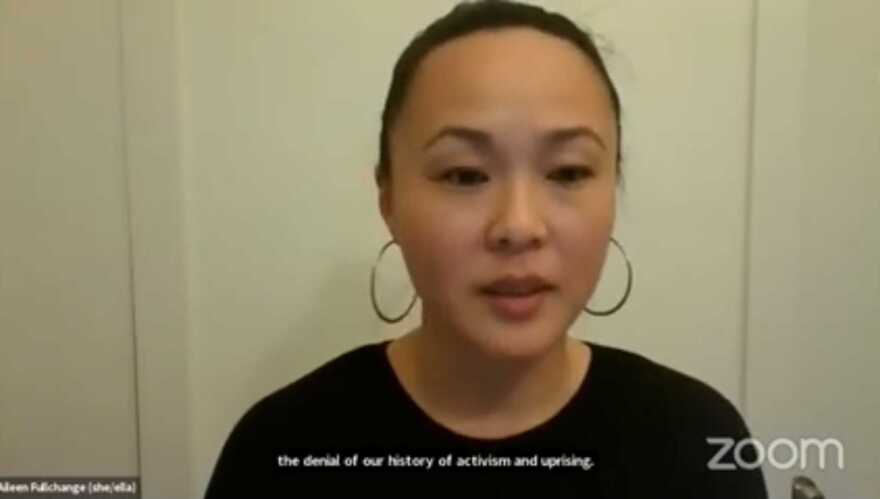Across the country, communities are reeling from last week's mass shooting in Atlanta, where six of the eight people killed were Asian American women.
The shooting has sparked conversations about the hyper-sexualization of Asian women in the U.S. At a virtual town hall called “Responding to Anti-Asian Violence” hosted by Dallas Truth, Racial Healing and Transformation, many Asian American women stepped forward to share their experiences.
“To be Asian in this country is to not be seen or heard — even when we yell, we cry, we scream,” said Aileen Fullchange, an Asian American woman living in Dallas and a member of the organization.
Fullchange shared two heartbreaking experiences where she’s felt objectified. One, when she was 12-years-old and accompanied her parents to city hall to ask for more information on how to gain U.S. citizenship.
“As I was going through the security protocol on the building, going through the metal detector, having my bag search, one of the security guards who was a 40 to 50-year-old white man started catcalling me,” Fullchange shared.

The other experience happened more recently at a dinner table.
“A white man who was a friend of a friend of mine, just abruptly, put his hands over around his eyes and pushed them back and literally started saying 'ching chong' and then asked if I understood,” she said.
Fullchange pointed to sexism against and fetishization around women who look like her.
Several nonprofits across the country participated at the event.
Inhe Choi with the HANA center, a Korean American human rights organization in Chicago, said it's important to address the root causes.
“Imperialism, militarism and corporate greed dehumanize, displace and target us,” Choi said.
“There needs to be accountability with a clear understanding that it's racism, white supremacy, gender-based violence and racialized misogyny that are the underlying cause of the violence committed.”
During the event, Choi blamed former president Donald Trump who she says “emboldened white supremacists to fully express themselves” and inflict violence.
According to Pew Research, about 4-in-10 U.S. adults say it has become more common for people to express racist views toward Asians since the pandemic began.
Choi adds it’s also important to remember and learn about the long history of Anti-Asian hate in the U.S.
“This country has killed millions of Asians and destroyed our homelands,” said Dr E.J. Ramos David, psychology professor at University of Alaska Anchorage.
“This country objectified and hypersexualized Asian women and once you see people, stereotypically as less complex, as less whole, as less human, then you're more likely to become violent toward them.”
There are no words to express what tonight meant for me. I think I'll finally be able to get a full night's sleep again: https://t.co/TH9m78bIoE@dallastrht #howweheal #stopasianhate pic.twitter.com/kfQXYYllhe
— Stephanie Drenka | 신경선 (@stephaniedrenka) March 24, 2021
At the event Amy Tran-Calhoun, an Asian-American woman living in Dallas, talked about the mental health toll of discrimination and violence on Asian Americans and Asian American women.
“At this moment, I have chosen to create boundaries in order to preserve my well being,” she said. “We have a compulsion to jump to action to solve a problem rather than experience our feelings.”
Tran-Calhoun, who’s the daughter of Vietnamese refugees, said she’s long internalized many feelings and felt she didn’t “deserve the time to process and heal, that like many of our immigrants or refugees, parents and families as a survival response.”
She said she’s done internalizing her pain, and wants fellow Asian Americans to allow space for “our feelings, to live and to breathe, they often physically manifest in our bodies... That emotional pain then transforms into physical ailment.”
She says the time is now to check in and listen to the racial trauma Asian Americans — specifically women — are going through.
“My headline tonight is healing is an action,” said Tran-Calhoun.
Got a tip? Alejandra Martinez is a Report For America corps member and writes about the impact of COVID-19 on underserved communities for KERA News. Email Alejandra at amartinez@kera.org. You can follow Alejandra on Twitter @alereports.
KERA News is made possible through the generosity of our members. If you find this reporting valuable, consider making a tax-deductible gift today. Thank you.



